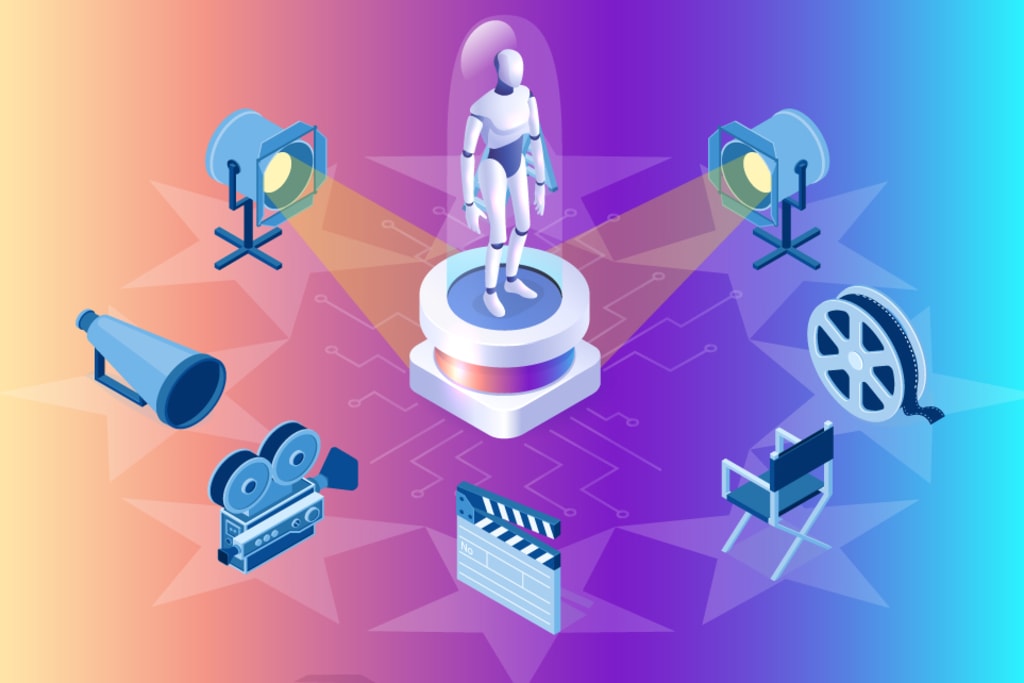Content warning
This story may contain sensitive material or discuss topics that some readers may find distressing. Reader discretion is advised. The views and opinions expressed in this story are those of the author and do not necessarily reflect the official policy or position of Vocal.
The Role of AI in the Entertainment Industry
Exploring the Impact and Implications of AI in Movies, TV Shows, Music, and Immersive Technologies

Artificial Intelligence has brought significant advancements to the entertainment industry, transforming the way we create, consume, and engage with various forms of entertainment content. From movies and TV shows to music and virtual reality experiences, AI technologies have made a profound impact across the entire entertainment landscape.
AI in Content Creation
Enhancing Special Effects and CGI
AI algorithms have revolutionized the field of special effects and computer-generated imagery (CGI). By using deep learning techniques, AI models can generate realistic visuals, intricate details, and breathtaking scenes that were previously difficult to achieve manually. From lifelike creatures and characters to stunning environments, AI-powered special effects have raised the bar for visual storytelling.
Automated Scriptwriting and Storytelling
AI has also found its place in scriptwriting and storytelling. Natural language processing (NLP) algorithms can analyze vast amounts of data, including existing scripts and narratives, to generate new storylines, dialogues, and even entire scripts. This AI-driven approach can provide valuable creative inspiration to writers and filmmakers, helping them explore new narrative possibilities.
Improving Music Composition and Production
AI has made significant strides in the music industry as well. Machine learning algorithms can analyze vast music databases to identify patterns, harmonies, and trends. This enables AI systems to compose original music, generate personalized playlists, and even enhance the production quality of songs. AI-powered music recommendation platforms have also made it easier for artists to reach their target audience and connect with fans.
AI in Content Recommendation
Personalized Movie and TV Show Recommendations
AI algorithms have transformed the way we discover and consume movies and TV shows. By analyzing user preferences, viewing habits, and demographic data, AI-powered recommendation systems can suggest personalized content tailored to individual tastes. This not only enhances the user experience but also helps content creators and distributors target their audience more effectively.
Music Discovery and Playlist Curation
AI-powered music streaming platforms have revolutionized the way we discover and enjoy music. By leveraging machine learning algorithms, these platforms can analyze listening habits, genre preferences, and even mood patterns to create personalized playlists and recommend new songs and artists. AI has made music discovery more effortless and enjoyable for users worldwide.
AI in Audience Engagement
Chatbots and Virtual Assistants
AI-driven chatbots and virtual assistants have become increasingly popular in the entertainment industry. These AI-powered interfaces can interact with users, answer questions, provide recommendations, and even engage in conversational storytelling. Chatbots and virtual assistants enhance audience engagement by creating interactive and immersive experiences.
Virtual Reality and Augmented Reality Experiences
AI plays a crucial role in creating captivating virtual reality (VR) and augmented reality (AR) experiences. By combining AI algorithms with computer vision and sensor technologies, VR and AR applications can provide users with realistic and interactive experiences in various entertainment domains, such as gaming, live events, and immersive storytelling.
AI in Marketing and Distribution
Targeted Advertising and Audience Analytics
AI-powered algorithms enable targeted advertising campaigns that reach the right audience with personalized messages. By analyzing user data, including preferences, behaviors, and demographics, AI can optimize advertising strategies and maximize the impact of marketing campaigns. Additionally, AI-driven audience analytics provide valuable insights into consumer trends and preferences, helping content creators and distributors make data-driven decisions.
Content Distribution Optimization
AI helps optimize content distribution by analyzing vast amounts of data, such as viewership patterns, engagement metrics, and social media trends. This enables content creators and distributors to identify target markets, devise effective distribution strategies, and reach a wider audience. AI-powered content distribution platforms streamline the distribution process, making it more efficient and cost-effective.
Ethical Considerations and Challenges of AI in Entertainment
While AI brings numerous benefits to the entertainment industry, it also raises ethical considerations and challenges that need to be addressed. Some of these include:
Privacy Concerns
The use of AI in entertainment involves collecting and analyzing vast amounts of user data. This raises concerns about privacy, data security, and the responsible handling of personal information. It is essential for companies to prioritize user privacy and ensure transparent data practices.
Bias and Representation
AI algorithms can inadvertently perpetuate bias and lack diversity if not trained with inclusive and representative datasets. Content creators and AI developers must work together to ensure fairness, inclusivity, and representation in entertainment content generated or influenced by AI.
Job Displacement
As AI continues to automate certain tasks and processes, there is a concern about job displacement in the entertainment industry. It is crucial to find a balance between AI-driven automation and preserving human creativity and craftsmanship.
The Future of AI in Entertainment
The future of AI in the entertainment industry looks promising. Advancements in AI technologies, including natural language processing, computer vision, and machine learning, will unlock new possibilities for content creation, personalized experiences, and audience engagement. AI will continue to shape how we consume and interact with entertainment content, making it more immersive, personalized, and accessible.
Conclusion
AI has become an integral part of the entertainment industry, revolutionizing content creation, recommendation systems, audience engagement, marketing, and distribution. With its ability to analyze vast amounts of data and generate personalized experiences, AI has transformed how we experience movies, TV shows, music, and immersive technologies like VR and AR. However, ethical considerations and challenges must be addressed to ensure that AI-driven entertainment is inclusive, diverse, and respects user privacy. As we move forward, the future of AI in the entertainment industry holds tremendous potential for innovation, creativity, and enhanced user experiences.
About the Creator
Enjoyed the story? Support the Creator.
Subscribe for free to receive all their stories in your feed. You could also pledge your support or give them a one-off tip, letting them know you appreciate their work.





Comments
There are no comments for this story
Be the first to respond and start the conversation.